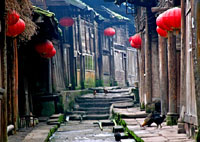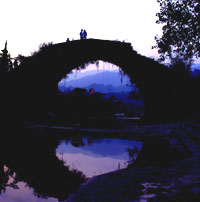| Tools: Save | Print | E-mail | Most Read |
| Looking at Fish and Resting Your Soul |
| Adjust font size: |
With its noisy barber shop, tea house, which also provides accommodations and tour services, famous "Ya" fish in the nearby The huge stone Under my friend's guidance, I traced the big stone at the base of Wangyu. Crossing a narrow alleyway from the primary school behind the main street f the town, I found the huge rock sat amidst villagers' houses. Some parts of the main bluestone path were even laid on top of the rock.The noisy barber shop There are more than 50 families, around 200 residents, living in Wangyu, with a grocery store selling salt, vinegar, cigarettes, wine, towels, toothpaste and laundry powder, a barber shop and a newly opened teahouse and hostel. The barber shop was the noisiest place. The barber Yin, 60 years old, has lived here and worked as a hairdresser since his teenage years.
"I used to help people clean their eyes with razors, but had to give up because of the government's ban-it was too dangerous.Yin has never traveled to a distant place, but he's the most knowledgeable man in town. Although the barbershop is small, its bench remains packed full of people waiting for their haircut and sharing stories with Yin.Most of the residents didn't wan me to take their picture, except for a young man Gu Yong, the owner of a tea house. Tea house hostel The tea house was more a hostel. Its second and third floors were all for visitors to live in. The walls were decorated with bamboo. Gu was a local, but didn't live in the old town. He bought the old house to run his tea and hostel business. His hostl also provides tour guide services for visitors. Gu bought a camera for more than 6,000 yuan (US$775) to take pictures of the town's beautiful views and put them on his website. He worried only the old street and townwere attractive, and worried one day, the environment of the town could be destroyed by tourism. "Though tourism is developing, the visitors might stop coming if the environment here loses its quaint appeal," Gu said. Ancient town perched above a modern village A spring afternoon witnessed my visit to I eventually arrived at a small town. To my disappointment, the town was full of modern buildings, far different from what I expected. Locals told me it wasn't the old town, but newly constructed. "The ancient town is halfway the mountain," I was tolI counted 118 steps on my way up, and at the top, the old town was in sight. The ancient town continues even spite of developments further down. I felt like I was walking in an ordinary village only minutes before, but soon after, I was in a town which carried me back to centuries ago. The buildings sit alongside the main bluestone path, and all were constructed in ancient style. Wooden beams and black tile roofs were everywhere. It was the same as other ancient villages in The newly built village below obviously attracted residents of the ancient town. Some has moved to the new town, leaving their empty houses behind. The bluestone street was silent except for the slight clapping of my shoes. The elders sat under their roofs, sunning themselves, and students strolled by and yellow wars of corn hung from the rooftops. Transportation Accommodation Accommodations are sparse in the ancient town. There are two tea house hostels-the rest are in the ew village. The price is generally five yuan per bed. Some of the restaurants there also provide accommodations. There are around seven to eight beds in each hostel. Wangyu Hostel Tel: 0836-231 4275 (Beijing Today March 9, 2007)
|
| Tools: Save | Print | E-mail | Most Read |
 |
| Related Stories |
|
|
Product Directory China Search |
Country Search Hot Buys |

